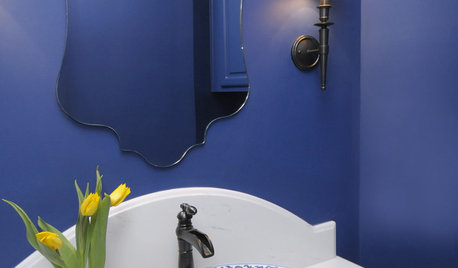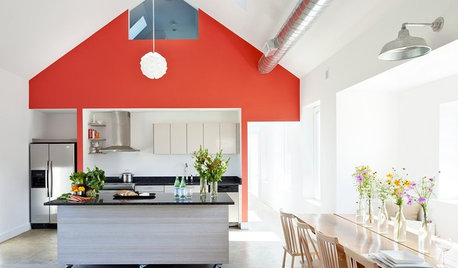Black Vs. Red Raspberries
Skim94
10 years ago
Related Stories

PINKLoving Color: Enjoy the Sweet Taste of Raspberry
Try this confident pink for bold color all over, or step into it lightly with just the right raspberry accent
Full Story
COLOR PALETTESBet on Black and Red for a Winning Combination
A striking look is a sure thing when you pair red and black around the home
Full Story
BLACKHollywood Glamour In Black, White and Red
The Ultimate Bold and Light Colors Create Drama Together
Full Story
SHOP HOUZZShop Houzz: Black, White and Red Kitchen
Turn up the heat in your kitchen with bold red decor teamed with classic black and white
Full Story
DECORATING GUIDESRoom of the Day: Black, White and Red All Over
Custom fabric, heirlooms, bold color and a beloved collection of books cozy up this farmhouse library
Full Story
HOUZZ TOURSMy Houzz: Red and Black Pop in a German Penthouse
See how an eye-catching color scheme, international finds and understated charm raise the style factor in this decorator's home
Full Story
BATHROOM DESIGN8 Bold Paint Colors for Your Powder Room
Turn your powder room into a exclamation point with a bold shot of red, raspberry, hyacinth, rich brown or stormy blue
Full Story
COLOR10 Reasons to Make a Splash With Tomato Red
You won’t duck at these tomatoes. See how bold red shades can play up architecture, light up a dark spot and add drama
Full Story
REDRavishing Reds, Pinks and Purples for Fall 2012
Whether you love a fine wine color or go cuckoo for berry, this season's runways are offering some hues for your home to savor
Full Story
COLORHot Uses for Red Around the House
Spark some excitement from the front door to the back bedroom by bringing in this sultry, sexy color
Full Story






jstubbs_gw
fruitful412
Related Professionals
Ashburn Landscape Architects & Landscape Designers · South Orange Landscape Architects & Landscape Designers · Norwood Landscape Contractors · Wilmington Landscape Contractors · Andover Landscape Contractors · Firestone Landscape Contractors · Fountain Valley Landscape Contractors · Fuquay-Varina Landscape Contractors · Lynwood Landscape Contractors · Mequon Landscape Contractors · Overland Park Landscape Contractors · Palatine Landscape Contractors · South Lake Tahoe Landscape Contractors · Tigard Landscape Contractors · Tinton Falls Landscape Contractorsmurkwell
lawanddisorder
drew51 SE MI Z5b/6a
lawanddisorder
calliope
drew51 SE MI Z5b/6a
3quartersofcrazyfarm
drew51 SE MI Z5b/6a
Skim94Original Author
jstubbs_gw
drew51 SE MI Z5b/6a
skyjs
bob_z6